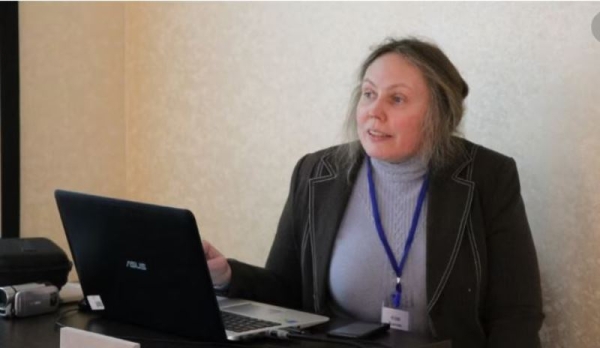
Migrant rights defender Valentina Chupik says new legislation on migration adopted by Russia's State Duma this week will dramatically restrict the rights of labor migrants.
Speaking to Current Time on July 25, Ms. Chupik said the new bills passed by the lower house will allow Russian police to fully control the everyday routine of labor migrants and bar them from leaving their homes, even to work or shop, if they decide to do so without a court decision.
“In addition to that, the so-called migration search regime would allow any police officer to detain labor migrants for up to 48 hours to check if they are being sought under the migration search regime,” Chupik said.
According to her, the new laws will affect the lives of foreigners in Russia. The bills allow the police to decide if migrant workers should be deported and allows for such deportation to be conducted within 48 hours.
"Importantly, this is a controlled residency regime under which any police officer can force any migrant to stay continuously at their registered address, not even going out to work or to the store for bread. Additionally, the migration search regime allows any police officer to detain any migrant for up to 48 hours under the pretext of checking whether they are in the controlled residency regime," Chupik said.
Chupik also highlighted the danger posed to migrants by the "loyalty obligation" they will be required to sign upon entering Russia. This obligation, she emphasized, will effectively strip migrants of the right to challenge any actions by government officials.
The new laws also make it possible to deport migrants for accusations such as "participating in or organizing a mass gathering of citizens."
“A mass Islamic prayer, because there are not enough mosques, or a line to a migration registration center—such queues are often created artificially–a crowd of migrants at a construction site, migrants' wedding party, or burial ceremony — all can be defined as mass gathering, and anyone who attends such events can be deported,” Chupik said.
Recall, the State Duma (Russia’s lower chamber of parliament) has passed a package of laws that tighten control in the migration sphere. Among the changes is the introduction of the "deportation regime," which will apply to migrants alongside the existing deportation and administrative expulsion regimes. The deportation regime entails that migrant offenders will be included in a special register and must report their whereabouts to the police. Migrants on this list will be unable to buy housing or cars, take out loans, get married, or move freely within the country. According to the authors of the law, this measure will help prevent gray and fraudulent legalization schemes. For repeated violations, authorities will decide on deportation, a procedure that is significantly simplified and will be conducted without court involvement.
The bills still have to be approved by the parliament's upper chamber, the Federation Council, before they are endorsed into law by President Vladimir Putin.
The legislation comes amid rising anti-migrant sentiment following the arrests of several Tajik citizens suspected of being involved in a terrorist attack in late March on an entertainment center in Krasnogorsk that left 144 people dead.




